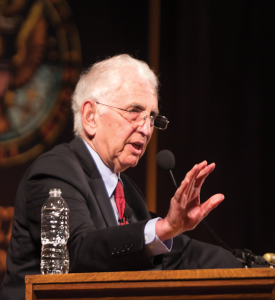
Daniel Ellsberg condemned government surveillance during his keynote Tuesday.
Daniel Ellsberg, the former United States military analyst who famously released the Pentagon Papers to national newspapers, spoke about mass government surveillance in the modern world in Gaston Hall on Tuesday evening. The event, called “Beyond Orwell: Surveillance, Secrets and Whistleblowers in the Security State,” was sponsored by the Lannan Center for Poetics and Social Practice.
The evening opened with a videotaped address by Guardian journalist Glenn Greenwald, who broke the Edward Snowden story. Ellsberg then delivered the keynote address, followed by a panel discussion.
Author and film producer Anthony Arnove, who co-produced the acclaimed documentary “Dirty Wars” last year, moderated the panel, which included former National Security Agency executive Thomas Drake, former National Intelligence Estimates Chair Ray McGovern, former Ethics Advisor to the U.S. Department of Justice and Snowden’s attorney Jesselyn Radack and former FBI agent Coleen Rowley. The panelists all shared the view that the current U.S. government has perpetrated constitutional violations.
Ellsberg released the Pentagon Papers in 1971, revealing misperceptions of U.S. intentions during the Vietnam War and hastening its end. In his address, Ellsberg stressed the importance of a republican government in which information is public.
“Benjamin Franklin was asked at the end of the constitutional meetings, ‘What kind of government is it?’ and he said, ‘A republic, if you can keep it,’” Ellsberg said. “Have we kept it? No, we have not. Could we get it back? I would say not without people who are willing to take the risks.”
In order to make a change and preserve the republic, Ellsberg said it is important for citizens to listen to their consciences and take action in the face of injustice.
“Most officials, who were my colleagues at that point and people in Congress, never do find a degree of wrongdoing or injustice that will lead them to cross the line of exposing it or resisting it or putting themselves on the line,” Ellsberg said. “I asked [Snowden] what message he thinks I should give and he said, ‘If you believe in something, stand up for it.’”
Drake, a whistleblower who was indicted under the Espionage Act but exonerated of 10 felonies, argued that although citizens may not have anything to hide from the government, their privacy should be of the utmost importance.
“As sovereign human beings, we have a right to privacy and our own individuality,” Drake said. “What you do have to fear is that they can find out anything they want about you.”
Ellsberg said that professions that involve protecting confidentiality, such as journalism, could be drastically affected by increased government surveillance.
“If one branch of government has full knowledge of the private conversations, of the private lives … can it be that journalists can offer confidentiality to a source with any confidence?” Ellsberg said. “I would say no, that’s gone at this point.”
Ellsberg also expressed his appreciation and respect for citizens who fight to protect civil liberties. He said that he applauds whistleblowers for their courage and actions.
“I go out of my way to meet whistleblowers when they’re exposed or they’re prosecuted because I do feel that we’ve come from the same trajectory as insiders and have a similar experience and I respect what they’ve done,” Ellsberg said. “I want to thank them and I want to let them know that I congratulate them for what they’ve done and will help them as much as I can in the pressures that are brought to bear on them.”
Greenwald also acknowledged the similarities in the public reactions to the work of whistleblowers like Ellsberg, and more recently, Snowden and Chelsea Manning.
“Essentially, everything that is said now about Edward Snowden and other whistleblowers was said, virtually down to the letter of the script, about Daniel Ellsberg 40 years ago,” Greenwald said. “History has vindicated Daniel Ellsberg in such a way that almost nobody is willing to stand up in public any longer and contest the fact that what he did was noble and heroic.”
Channing Ruff (COL ’16) attended the event and said that the discourse gave him hope for the future of the United States.
“I thought that the speakers were very compelling,” he said. “Though their assessments were quite grim, I believe that there was a glimmer of hope, by having conversations such as this our generation can act to ensure that our nation doesn’t trample on our civil liberties in the name of national security.”




















